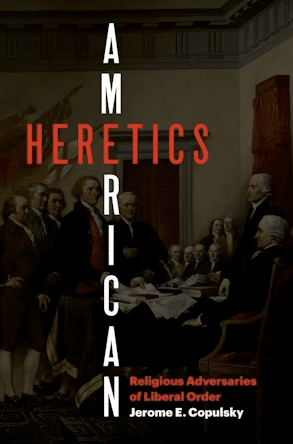Few parts of the Constitution are more treasured, at least rhetorically, than the First Amendment, which, in addition to articulating other rights, prohibited Congress from either establishing a religion or prohibiting its free exercise. These guarantees are essential to the political liberalism that pervades the Constitution as a whole and that has shaped American history.
Jerome E. Copulsky, a research fellow at the Berkley Center for Religion, Peace, and World Affairs at Georgetown University demonstrates in this enlightening heresiography that these liberal values have from the beginning been contested by those who want to situate the nation on more explicitly religious and less tolerant political foundations.
The Founding Era and Early Republic
Loyalist clergy, the Anglicans among whom had taken an oath to the king, opposed the American revolution as being contrary to scripture, even as the new nation was being birthed by individuals who believed they were asserting their rights as Englishmen. They believed that monarchs were ordained by God and anticipated that society would disintegrate without a king and an episcopacy to unite it. Many closed down their churches rather than eliminate the prayer on behalf of the king, or substitute a prayer for Congress, and many Anglican priests returned to Britain rather than remain in America.
Although the nation soon ratified the Constitution that was proposed by the convention that met in Philadelphia in 1787, a group of Presbyterians known as the covenanters argued that the Constitution was radically defective, both in not including a religious test for office and in not mentioning God and his sovereignty. In so doing, they were building on Anti-Federalist criticisms that the Constitution would permit Roman Catholics, Jews, Muslims, and free thinkers to win public office.
Northern and Southern Calls for Constitutional Recognition of God
Subsequently, the proslavery advocates succeeded in getting the southern states to secede in order to protect what they believed to be the God-ordained institution of slavery. They sought to build a stronger foundation by specifically acknowledging both God and slavery in the Confederate Constitution.
In the North too, there was a developing movement for a “Christian Amendment” that would specifically acknowledge God in the U.S. Constitution. This, in turn, stimulated support for an expansion of the First Amendment, which would extend prohibitions of an establishment of religion to the states and eliminate oaths acknowledging God in courts (p. 141). The so-called Blaine Amendment, which was incorporated in many state constitutions, sought o prevent state aid to Roman Catholic parochial schools.
The Cold War Period
Although none of these amendments were adopted at the national level, the 1950s witnessed the birth of the National Prayer Breakfast, and the congressional adoption of the motto “In God We Trust” and the addition of the “Under God” to the pledge of allegiance. Sociologist Robert N. Bellah further highlighted the role of “civil religion” in America.
At about the same time, the Jesuit priest John Courtney Murray was leading the Catholic Church away from the idea that freedom of religion was simply a temporary expedient until Catholics could gain control to the idea that the First Amendment was consistent with the idea of Christian liberty. He explained the provisions within the First Amendment as “articles of peace,” rather than “articles of faith” (p. 175).
In the 1970s, Jerry Falwell founded the Moral Majority, which was based on the idea of restoring America to what he believed to have been its Christian foundations, and which he believed were being undermined by “secular humanism.” Theologian Francis Schaeffer viewed the Court’s decision in Roe v. Wade (1973) as undermining the moral foundations of the nation.
Rousas John Rushdooney further outlined the ideals of the Christian Reconstructionist movement, which would establish the foundation of U.S. government on the laws of Moses. More overly anti-democratic than most of the previous movements, he and his followers emphasized the priority of the will of God over that of the voice of the people, and openly advocated enforcing law that were good for the people whether they recognized it or not. This is, in turn, related to the Seven Mountain Mandate and other movements that attempt to put Christians in control of the key mountains of culture. Some have further advocated not simply recognizing God in the Constitution but specifically recognizing “the Trinitarian God” of Christianity (p. 238).
Continuing Challenges
The Supreme Court decision recognizing same-sex marriage in Obergefell v. Hodges (2015) stimulated further critiques of freedom of religion and liberalism. Copulsky puts particular focus on Adrian Vermeule’s calls for courts to reapply natural law principles, on Rod Dreher’s call for Christians to embrace the “Benedict Option” of withdrawing into their own enclaves, and to Donald Trump’s ties to Christian nationalism.
In a concluding chapter, Copulsky observes that “[t]oday’s religious adversaries of American liberal democracy” include “so-called Christian nationalists who would reinstate conservative Protestant supremacy over public life; Catholic integralists calling for a confessional state; [and] Charismatic Dominionists donning the ‘armor of God’ for spiritual warfare to take control of the commanding heights of cultural, economic, and political power and bring about the ‘Kingdom Now’” (p. 286).
Noting America’s increased religious pluralism, he observes that “If it is to endure, America’s liberal democracy will have to be sustained in the absence of a moral consensus or clear-cut spiritual foundations. And its citizens and others who dwell and sojourn within its borders will have to manage to live together with all of their profound and intractable differences. This requires an ongoing exercise in democratic virtue and liberality,” which Copulsky rightly characterizes as “a serious moral project” (p. 288).
For Further Reading:
- “Baptizing America: How Mainline Protestants Helped Build Christian Nationalism,” by Brian Kaylor and Beau Underwood. Danvers, MA: Chalice Press, 2024.
- “The Violent Take It by Force: The Christian Movement that is Threatening Our Democracy,” by Matthew D. Taylor, Minneapolis, MN: Broadleaf Books, 2024.
John R. Vile is a political science professor and dean of the Honors College at Middle Tennessee State University.

